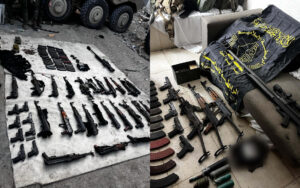Hidden weapon arsenal in Al Shifa Hospital’s Maternity Ward
In late March, the Israeli army (IDF) released footage showing the huge weapons store seized at the Al-Shifa hospital’s maternity ward
– No other hospital in the world looks like this. This is what a terrorist nest looks like – said Prime Minister Benjamin Netanyahu at a press conference on March 31

Weapons seized by Israeli troops in the maternity ward of the Shifa hospital in Gaza. The picture was published on March 31, 2024. Photo: IDF
The weapons, including explosives, sniper rifles, assault rifles, handguns and other military equipment were found hidden inside patients’ pillows and beds and in the building’s ceiling and walls, reports the IDF. The Israel Defense Forces (IDF) withdrew from Al-Shifa hospital on April 1 after a two-week clearing raid in which the military reported that it detained or neutralised hundreds of suspected terrorists.
During the operation which began on March 18, around 900 suspects were taken prisoner of which over 500 were confirmed terrorists. More than 200 gunmen were eliminated. Among those killed or captured were senior commanders within Hamas and Islamic Jihad. The military described the raid as one of the most successful operations of the nearly six-month long war.
The Times of Israel detailed how Hamas denies any activity at Al-Shifa or other hospitals despite overwhelming evidence to the contrary. Many of the trapped gunmen refused to surrender, engaging instead in fierce fighting with Israeli troops. The IDF had previously cleared the Al Shifa hospital back in November but Hamas fighters had since returned.
6,200 evacuated
Approximately 350 patients and medical staff at Shifa Hospital were evacuated by the IDF to a designated facility in another part of the complex where the IDF provided them with humanitarian aid and supplies. Another 6,200 civilians hiding in the medical center were evacuated from the premises, the IDF reported.
On April 8 the Israeli Defense released a video of the interrogation of the spokesman for the political branch of Islamic Jihad in Gaza, in which he admitted that the terrorist group tried to hide the fact that one of its rockets hit the Al-Ahli hospital early in the war. He also confirmed that terrorist groups use “all the hospitals in the Gaza Strip.” Tarek Abu Shaluf was among 500 terrorists captured by the IDF at Al-Shifa hospital in March, the military reported.
Daniel Hagari, Israel’s military spokesman, said Hamas and Islamic Jihad had established their headquarters inside the hospital. He described days of close combat and accused Hamas gunmen of barricading themselves inside hospital wards while others threw grenades at the facility.
Joint statement
Israel accused Islamic Jihad of firing the failed rocket that hit the hospital in late October, reportedly killing dozens of people, hours after Hamas officials falsely blamed Israeli for the attack that killed “500” people, a claim that international media promptly reported. – To counter this report the Islamic Jihad group made some moves. It made up a story that the rocket belonged to the occupation (Israel) and that the target was the [hospital] building, said Abu Shalaf.
Asked by the interrogator which hospitals Islamic Jihad and Hamas use in Gaza, Abu Shalaf said: “All the hospitals. Because there’s 24-hour internet there and electricity 24 hours a day,” explaining that when terrorist groups use the hospitals, they occupy one or two rooms in each ward without having to close an entire ward. Abu Shaluf also described in the interrogation how the hospitals’ ambulances were commandeered by terrorists.
International law states that a medical facility – which is a protected location in the event of a conflict – loses this status if it is used for military activities. On several occasions Israel has presented evidence that Hamas and Islamic Jihad misuse medical facilities as shelters for terrorist purposes and adds that the terrorist groups loot humanitarian aid to provide supplies for themselves, depriving the civilian population of their necessities.



